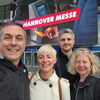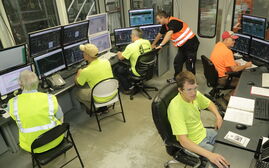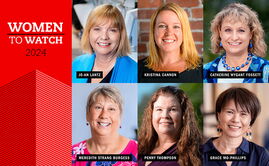
Startup stress: Frank talk from Maine entrepreneurs navigating business ownership’s mental strains
 Photo / Tim Greenway
Grace Mo-Phillips is a South Portland-based entrepreneur who also serves as program director of the CEI Women’s Business Center in Portland.
Photo / Tim Greenway
Grace Mo-Phillips is a South Portland-based entrepreneur who also serves as program director of the CEI Women’s Business Center in Portland.
Balancing two jobs and multiple time zones, Grace Mo-Phillips often finds it hard to “switch off” from her work as a solo entrepreneur and program director at the CEI Women’s Business Center in Portland, one of three in Maine run by Coastal Enterprises Inc.
“I work around the world clock, so I don’t feel I’m managing it very well,” she admits. “The only saving grace is that my kids are getting a little bit older and don’t need my constant attention, which allows me to manage both careers simultaneously.”
The Hong Kong native devotes early mornings and evenings to running Belle Cove LLC, an exporter of frozen seafood mainly to Asia, from her South Portland home. During regular business hours in Maine, she advises fellow female entrepreneurs, many of whom are immigrants and from diverse backgrounds.
“The women we work with all have multiple jobs, and they are still the primary caretaker for their children. They wear multiple hats, and that really slows down your progress,” she says. “I cannot tell you how often we have to postpone one of our meetings because someone has to take care of a sick child, or has just come back from an overnight shift.”
While some of the challenges stem from language and cultural barriers, Mo-Phillips knows from experience that business ownership is stressful to begin with, particularly one-person ventures like Belle Cove that make up close to 80% of Maine’s 151,000 small businesses.
“It’s a very lonely journey to be an entrepreneur,” she says.
Job-related stress, also very real for those leading a team of employees, is documented in various studies and gained greater attention — and urgency — during the pandemic.
A survey of U.K small business owners, published by New Zealand-based accounting software firm Xero in May, found the pandemic to be the greatest cause of poor mental health for over a third of respondents, who also reported an emotional impact from issues such as cash flow and the cost of living. Another study, published in 2020 by England’s Emerald Publishing, notes that “stress is a universal, tangible variable that profoundly influences the entrepreneurial process” and highlights the importance of recovery to prevent exhaustion and burnout. In Maine, entrepreneurs interviewed by Mainebiz for this story report a variety of stress factors related to business ownership, and coping strategies from meditation to scheduling time off.
‘A blessing and a curse’
To a large extent, some of the strengths that drive people to start businesses – passion and dedication, a strong work ethic and ability to multitask – can also lead to stress.
“Anytime that you’re having to create anything in order to earn income, in order to live, is just inherently stressful,” says Nick Risma, owner of Tortoise Labs. Working mainly from home in Carrabasset Valley for clients nationwide and abroad, founded the company nine years ago to help entrepreneurs launch apps, products and services.

“That level of stress for me hasn’t really gone away, but I’ve gotten more confident, and I’ve grown the skills that are required in order to help me mitigate that stress and that anxiety.” A self-described habitual calendar person, Rimsa uses the Calendly platform for all scheduling, including time to lift weights or play basketball, saying: “If it’s on the calendar, I’ll do it.”
He also prioritizes time off after learning a hard lesson about self-care during the pandemic.
“I had COVID last year, and I was physically unable to work for two weeks,” he says. “I learned just how important it was to not rush back to work even when I was beginning to feel better. It was a helpful reminder that when we don’t take the rest we need, our bodies force us to take it.”
Disconnecting is tougher for Nancy Marshall, head of Augusta-based Marshall Communications, who can’t recall a day she ever stayed off of email.
“I know it sounds awful, but I have always stayed on top of emails,’ she says. “That’s how I am able to take advantage of opportunities. Some people might thing that’s a bad thing, but it’s in my DNA as an entrepreneur. I work hard to delegate responsibility to members of my team, but there are inevitably things that only I know. It’s a blessing and curse I suppose, but thankfully I love what I do.” Trained in a 24/7 work ethic at Sugarloaf ski resort early in her career, but not wanting to sound like a workaholic, Marshall adds: “I have figured out how to make this work for my life, but I realize that a lot of my life is centered around my work.”
Speaking as a mother, she says, “I don’t know if Craig [her son] appreciates that I worked while I was in labor with him, but I know that when he was salutatorian in his graduating high school class, he said that he learned his work ethic from his mother.”
Avoiding ‘toxic positivity’
While the language of startups and entrepreneurs often centers on growth, targets and next steps, an overly positive approach, it is not necessarily healthy.
“There’s a thread running very strongly through American culture that everyone is always fine and doing well,” says Helkin Berg, founder and CEO of a women’s wellness startup called Hey Freya she runs from her home in Cumberland. “Unfortunately, it’s not everyone’s reality, and those slipping into a worse place can actually exacerbate the struggles they’re having and feel like they don’t belong.”
Accentuating only the positive — and ignoring the negative — is known in psychology as “toxic positivity.” Berg, a mother of two five-year-old twins and an eight-year-old, will have none of it from fellow parents who pretend their kids are perfect angels who have never disrupted their sleep, or from advisors to Hey Freya. The company, named for a Nordic goddess and also her daughter’s name, aims to offer innovative health solutions to women between pregnancy and menopause to help them “unlock their best selves.”
“My company is about showing people that they do belong, and I take that same approach to how I create this supportive community,” she says. “If you can’t acknowledge things aren’t going well, you can’t fix them.” She also says that while she used to work 24/7 that’s no longer the case — something she and her fellow co-founders, whom she connected with virtually and recently met in person for the first time, agree on. One works in the San Francisco Bay area, another in Vancouver, and they all dedicate time for parental duties and other activities when they can’t be interrupted. Berg will also put her phone out of reach to get into a “flow state” for a work-related task requiring concentration.
“If I did not have supportive colleagues, it wouldn’t be happening,” she says.

Finding balance
As an executive coach and trainer with a practice focused on “helping ambitious people achieve more and stress less,” Portland-based psychologist Amy Wood has a front-row seat to entrepreneurs under stress.
That includes Wood herself, who launched her practice 22 years ago after a corporate career. That required an adjustment, including learning to schedule vacation time during summer when business was slower. She also takes mornings off to exercise, meditate and write, then starts her workday three times a week around 1 p.m. She also goes to bed at the same time every night with a relaxing evening routine to get into sleep mode and schedules social time with her favorite people, those “I don’t have to be ‘on’ for and can just relax with.”
Among the entrepreneurs she coaches, Wood finds that many stay up too late working and go to bed with their heads spinning. Nor do many take vacations, she says, “when the truth is if you take vacation time and you take regular breaks and you say ‘No,’ I can only take so many clients, you’re going to produce better work, and you’re going to be a lot healthier.”
Like Wood, music therapist Kate Beever of Maine Music & Health LLC runs a solo practice she finds to have pluses and minuses.
“It’s a double-edged sword because there’s some freedom in being a contractor, but it also means a lot of loneliness,” she says. “I’ve learned you can’t be good at everything, and that it’s important to delegate.” On that front she recently hired a writer to do her newsletter and blog and has hired occasional contractors to create logos and marketing materials.
“Accepting that I can’t be good at everything has been a great way to reduce the stress load,” Beever says.

While working in multiple settings from a hospital to clients in group homes and day programs can be draining, Beever says she makes monthly, weekly and daily to-do lists and tries to get outside time each morning. Winding down is harder, “but I try really hard to turn the phone off at night and not have it my bedroom so it’s not the last or the first thing I see.”
She also actively seeks out advice and perspective from fellow entrepreneurs and people working in different sectors. That includes astronauts, “and thinking about that perspective of the view of Earth from space and what really matters at the end of the day.”
For others, releasing stress involves more down-to-earth practices like meditation, as is the case with Rob Simopoulos of Defendify, a Portland-based cybersecurity startup that’s grown from 23 employees in early 2020 to 40 today. He tries to meditate daily for 20 minutes — which he says helps him stay calm and make better decisions.
“When I do get frustrated,” he says, “my wife will say, ‘Rob, you should go meditate.’ It’s a little bit like working out, and if I haven’t done it in four days, I can tell.”
Back in South Portland, Grace Mo-Phillips admits that while she’s not always adept at keeping herself sane, she tries to do so by exercising or something as simple as occasionally letting housework go or ordering pizza for dinner after a long day.
“I cannot tell you how my kitchen sometimes deteriorates,” she says, “but you have to make time for yourself.”














0 Comments